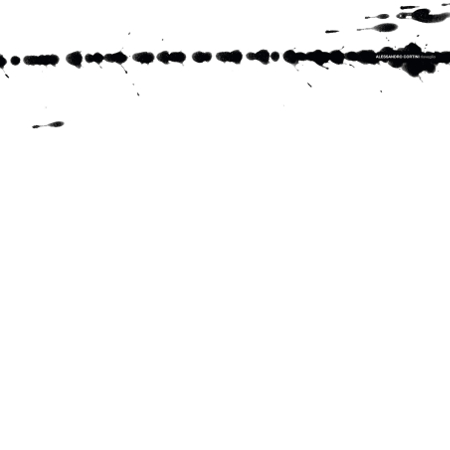One of the most unlikely moments of musical philosophy surely comes from the mouth of Peep Show‘s Super Hans when, while pressing a bass synth note, he utters the immortal line, "remember, the longer the note, the more dread." And of course he’s right. Ambient music has long utilised the idea of drones and sustained notes to invoke such feelings. Like the musical equivalent of the Deleuzeian time-image, the long drone highlights the breakdown of sound that’s organised by rhythms and movement, creating in its place a sense of memory and history, with the pitch and timbres of the sound opening and unfolding to our ears.
Alessandro Cortini is a musician who’s fast being recognised as a master at manipulating sound and time. A long-time connoisseur of analogue and modular synths, when he’s not performing as a member of Nine Inch Nails, he is more likely to be seen on YouTube videos tinkering and messing around with huge modular synth racks. His solo discography of synth music, in particular the album Sonno he released last year on Hospital Records, shows a musician capable of creating ambient music of eerie and physical uneasiness. With its thick, crepuscular drones and tape hiss textures, Cortini draws out the sense of the uncanny, his music a soundtrack to those night time non-spaces built by but uninhabited by humanity; multi-storey car parks, office spaces, industrial parks, hotel and office corridors.
Cortini now brings us Risveglio, a follow-up and continuation to Sonno. Like Sonno, Risveglio is an album created under severe restrictions and economy, composed while Cortini was on tour with NiN, with the tracks recorded in hotel rooms with a portable studio recorder. The capturing of fleeting moments of music on the hoof can be heard in instances on ‘Dormiveglia,’ which inexplicably stops less than 30 seconds in, while ‘Ricadere’ has fluctuating recording levels and the sound of cables being unplugged during the song.
While Sonno was made with a single Roland MC-202 synthesiser/sequencer, Cortini, with Risveglio, adds a synched TB-303 bass synth. In terms of self-imposed limits, Cortini’s setup is a closed system on starvation rations, with only Andreas Tilliander’s TM-404 alter ego (where he uses combinations of nine pieces of classic Roland equipment) coming close to such levels of creative austerity. The inclusion of a TR-606 drum machine on the final track, ‘La Sveglia (Drum Version)’, feels gaudy and ostentatious in comparison.
Despite such minimal and spartan conditions, Cortini makes his two machines sing to each other on Risveglio, creating remarkably dense soundscapes that bubble and oscillate in their own world. The opening two tracks, ‘Stambecco’ and ‘La Sveglia’, highlight how the TB-303, if not adding distinct rhythm, introduces a sense of movement to Risveglio’s sonic space imbibing a purpose of action to Cortini’s music. While the bass purrs and burbles in the background, Cortini inflicts queasy pitch-shifting notes reminiscent of Boards Of Canada at their most hypnagogic. These two elements or movement and sound, reach their highpoint on ‘Rispetto’, a track with crumpled clicks and pings that echo through darkened zones.
Despite the introduction of movement to Cortini’s music, Risveglio still contains huge monolithic surges of synthwash drones. ‘Lotta’ consists of a simple repeating melody structure whose sounds gradually increase in mass until the notes distort and lose their stability, bleeding and dissipating into each other until they become a single mass. ‘La Guardia’ is one of Risveglio‘s highlights; a pulsating bass line strafed by single note pulsars and shrieking atmospherics that come to a crushing, noisy conclusion.
Risveglio is an album that, while a continuation of Cortini’s increasingly esoteric and hermetic journeys to the edges of the analogue synth frontier, actually turns away from the idea that ambient music should be passive and pastoral. Its use of frayed tones and frequencies as the organising basis for movement and propulsion allows the music to seep into the cracks and pores of the space around you, extracting the anxiety and dread inherent hidden in our world around us. Embrace the abyss and enjoy.
<div class="fb-comments" data-href="http://thequietus.com/articles/18655-alessandro-cortini-risveglio-review” data-width="550">


